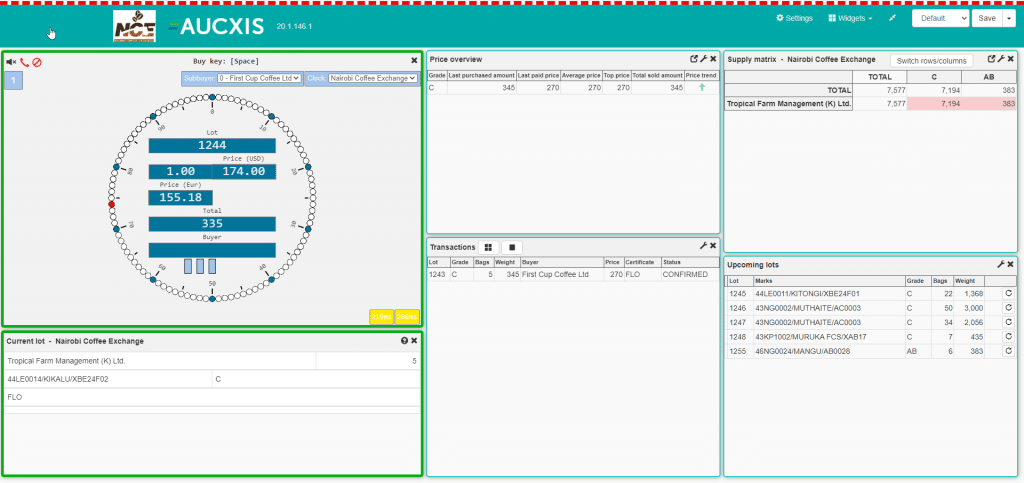Due to the coronavirus crisis, the Nairobi Coffee Exchange (NCE) was forced to close its physical auction room. As the auction could not fall back on a remote buying system, the sale of coffee became problematic. That is why business automation specialist speciality Aucxis says the NCE’s decision to apply its Kosmos real-time auction system in the cloud, was only accelerated.
Last summer, they made the switch to an online auction. Aucxis spoke to Daniel Mbithi, Executive Officer at NCE, for a first evaluation.
“Using Kosmos, the COVID-19 guidelines are met without stopping the trading. Initially, buyers were a bit sceptical about the online system, but we note a tremendous increase in confidence once they are trained on how to use it. Buyers are also enthusiastic because they do not have to face the Nairobi traffic jams anymore to come to the auction,” he said.
“After only a few weeks of using Kosmos, we can already state that more participants are attracted, which increases the competitiveness. This results into higher prices for the product and a better income for the farmer! We expect the prices to improve even more once we start marketing Kosmos outside of Kenya as well.”
Mbithi says the online sale of coffee by means of a clock system is “a unique experience for Africa”.
“As it is also our intention to increase the international accessibility of the Kosmos platform, we are confident that the coffee sale will grow exponentially over the years to come.”
Key advantages of Kosmos according to Mbithi:
- Easy connection and use for the buyers
- Fair competition and cost-savings for NCE
- Better prices for the farmers
- Transparency for all parties involved
NCE imports the sales catalogue in Kosmos, and the remote buyers log in on their standard PC to buy in real time on the clock. Stakeholders and growers can also follow the live sale in the cloud.
Growers and buyers can still retrieve individual reports via the information portal. In Kosmos, the possibilities regarding personal and general reports for the different user groups are even considerably extended in comparison with the previous system.
Mbithi adds, “Thanks to the fact that buyers can print their own reports, high printing costs for NCE are saved.”
As NCE is the first coffee auction in the world using Kosmos, Aucxis was faced with an important software change necessary for rolling out the project. Previously, Kosmos only supported the ‘falling price’ mechanism, which is used as standard for the sale of agricultural products such as flowers, fruit, and vegetables.
Coffee auctions, however, apply the ‘falling/rising’ principle: the price on the clock counts down at a set speed until someone pushes the button. In contrast to the Dutch auction, no transaction is closed at that moment, but a time bar – visualised by three dots – starts running during a set time. This is the “last call” to make a higher bid. If one or several other buyers also push their buy button before the time bar runs out, the price will go up at a set time interval.
Depending on the auction, the transaction is reached, or – in the case of NCE – there is a new last call for a higher bid, again via the time bar. This process will be repeated until one bidder remains.

